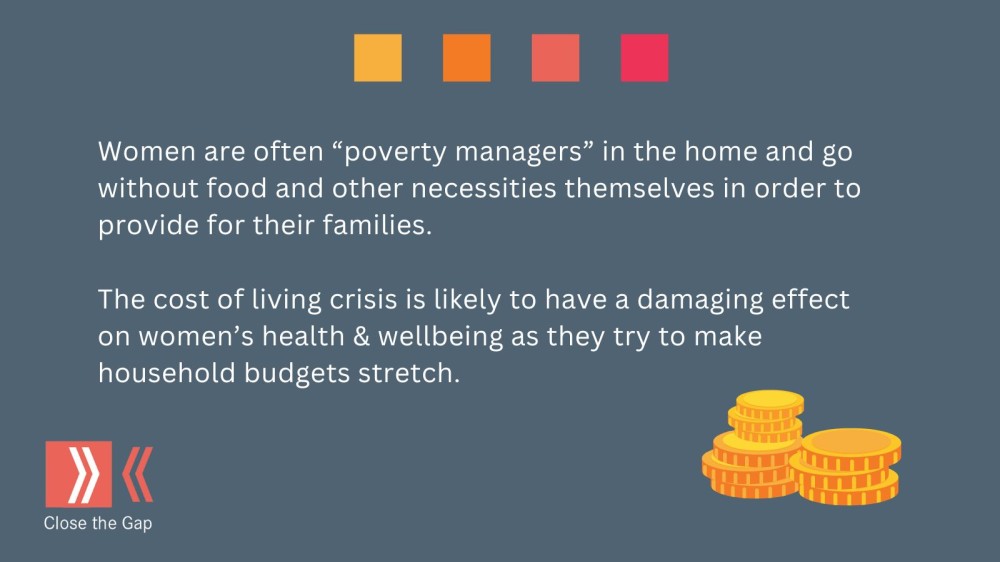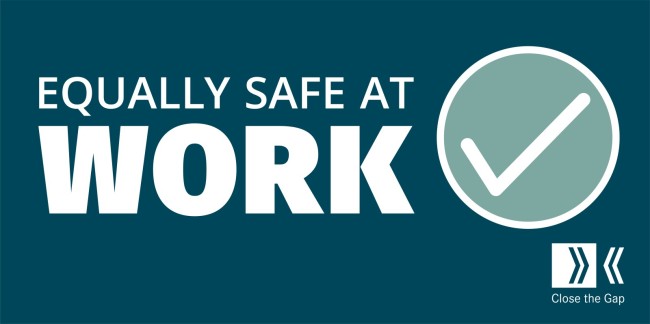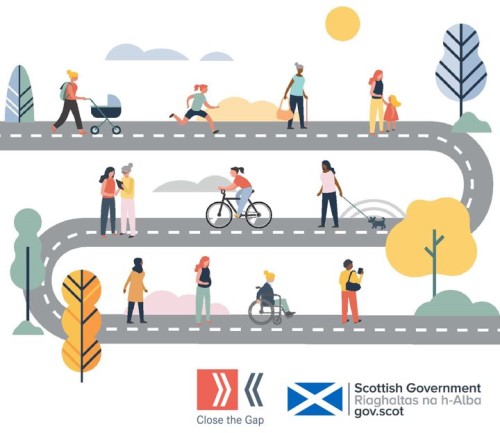Blog
Register for the online launch of Close the Gap’s new guidance on taking an anti-racist approach to tackling gender inequality at work

How to help prevent sexual harassment in the workplace?
Sexual
harassment is an endemic problem in our society. In the past decade, the global
"#MeToo" movement has helped to raise awareness of its prevalence, helping it to
become a high-profile issue.

Gender inequality means that women are being hardest hit by the cost of living crisis.

Why do we need a gendered approach when tackling rising economic inactivity?
Unemployment did not reach the unprecedented highs that were predicted during Covid-19. However, an unanticipated labour market trend emerging from the pandemic has been rising economic inactivity. Since the beginning of the crisis, there have been sharp increases in the numbers of people who are economically inactive due to retirement and ill-health, particularly among older workers.
We're hiring!
We’re looking for an enthusiastic person to work on the expansion of Equally Safe at Work, Close the Gap’s employer accreditation programme, in NHS boards, and the third sector. Committed to women’s labour market equality, you’ll be working within our small, busy team to influence improved gender-sensitive employment practice, and supporting employers to gain accreditation. You’ll also be designing shared learning opportunities, developing materials, writing reports, delivering events and building relationships with stakeholders.
Equally Safe at Work launches in NHS boards, and the third sector
Following the success of Close the Gap’s employer accreditation programme, Equally Safe at Work, with local authorities, we are pleased to be launching a new pilot of the programme with the NHS and the third sector. The evaluation of the pilot with local authorities highlighted that Equally Safe at Work was an important lever for enabling employers to take substantive action on gender equality and demonstrate leadership in violence against women.
An Unequal Burden: New briefing outlines how Covid-19 has affected women’s employment, financial security and unpaid work.
Women’s inequality has been exacerbated by the social, economic and labour market implications of the Covid-19 crisis. However, the lack of gender-sensitive, sex-disaggregated data created barriers to achieving a full understanding of women’s experiences of the pandemic. In particular, intersectional data relating to the experiences of disabled and Black and minority (BME) women in Scotland during the crisis is almost entirely lacking.
The Child Poverty Delivery Plan maintains a strong focus on work and earnings, but the need to address women’s poverty is less visible
The Scottish Government has published its updated Child Poverty Delivery Plan setting out the actions it will take to tackle child poverty across 2022 to 2026. The impact of Covid-19 and the ongoing cost of living crisis have contributed to a rising tide of poverty in Scotland, rendering the refreshed Plan more important than ever.
Expanding Equally Safe at Work: Piloting with NHS, Scottish Government and the third sector

Latest data on Scotland’s gender pay gap highlights women’s continued inequality in the labour market
The gender pay gap represents the divergent experiences women and men have not only in employment but also in education, training, care and other unpaid domestic labour. As the key indicator of women’s labour market inequality, data relating to the gender pay gap is critical to Close the Gap’s work.
Equally Safe at Work employer accreditation opens to new councils
Following the success of our Equally Safe at Work pilot with councils, Close the Gap is pleased to roll out this world-leading accreditation programme with a new cohort of councils from March 2022 to July 2023.
Scotland can’t become a fair work nation without realising fair work for women
As a result of women’s pre-existing inequality in the labour
market, women’s employment has been disproportionately impacted by Covid-19 job
disruption. This means that the pandemic has significantly increased the
challenges to realising gender equality at work. Other labour market changes,
such as automation and the threat to employment rights that Brexit presents,
also create risks to women’s equality at work.
Scottish Government’s commitment to improving the quality of work in Scotland,
through its flagship policy of fair work, therefore remains pivotal. However, fair work must mean fair work for women, too. Fair
work policy development must be better gendered if it is to create change for
women in Scotland.
We're hiring!
Close the Gap is hiring for two new positions! The first is for the role of Research and Evaluation Officer to support the delivery of our innovative Equally Safe at Work employer accreditation programme. The second is for the role of Communications and Administration Assistant, to assist with expanding our communications work and the smooth running of the organisation. You can find more information for both roles, and details of how to apply, below.
The pandemic hasn’t drastically changed the flexible working landscape, we still need regulatory and cultural change
The lack of quality flexible working opportunities in the UK labour market remains a key cause of the gender pay gap. The lack of flexibility sustains women’s concentration in low-paid, low-skilled work. This also results in women’s under-representation at management level and in senior grades. Improving access to flexible working is thus critical to addressing women’s low pay, tackling women’s poverty and child poverty, and closing the gender pay gap.
The Value of Social Care
The creation of a National Care Service is an opportunity to improve the lives of people who use social care and their families and carers. But whatever form it takes, a reformed social care system must address the undervaluation of its workforce if it’s to succeed in improving the quality and provision of care services in Scotland. To do this, we must acknowledge the reason that care work is so undervalued – because it’s seen as “women’s work”.
Equal Pay Day 2021: A look at BME women’s inequality at work
From today – Equal Pay Day – women are now effectively working for free until the end of the year. New data from the Office for National Statistics (ONS) shows that Scotland’s gender pay gap has narrowed slightly from 10.4% to 10.1%, suggesting women’s workplace inequality remains stubbornly entrenched. As with last year, the data comes with reliability warnings due to the impact of COVID on the sample size of employer pay data. Further COVID-related factors such as the recent end of furlough and the impact of labour market shortages also won’t be reflected in gender pay gap data for some time.
Women are more likely to experience long Covid but, once again, the system of support doesn’t meet their needs
The emergence of long Covid has exposed yet another way in which the pandemic has disproportionately affected women in Scotland. Long Covid describes symptoms that persist four weeks after contracting the virus. A TUC survey found that those with long-term Covid symptoms experienced brain fog (72%), shortness of breath (70%), difficulty concentrating (62%) and memory problems (54%). These symptoms have led to workers having to reduce their working hours, or stop working altogether.
Challenge Poverty Week: The next Child Poverty Delivery Plan must prioritise action on women’s labour market equality
Across Scotland an increasing number of women, and their children, are locked in the grip of poverty. We know that women are more likely to be in poverty than men; are more likely to experience in-work poverty; and are more likely to experience persistent poverty than men. The pandemic has exacerbated these trends, with women who were already struggling now under enormous financial pressure.
What will the end of furlough mean for women’s employment?
Despite the latest data showing that one-quarter
of employers across the UK were still using the scheme, the UK Government’s Job Retention
Scheme is scheduled to finish at the end of September.
Furlough
has been a welcome, if imperfect, intervention by the UK Government. The scheme has supressed unemployment, with
cumulative data showing that over 910,000 jobs in Scotland have been furloughed
over the course of the pandemic. Given women’s concentration in service sectors
such as retail and hospitality, the scheme has enabled women who work in these sectors
to protect some of their income during prolonged periods of sector shutdowns.
The decision to end the scheme in September has been viewed by some as an arbitrary
decision, not tied to any particular milestone in the pandemic or the state of
the economy. Indeed, the trajectory of the pandemic still remains
somewhat unclear. In Scotland, positive
cases and hospitalisations have been on the rise again and it is likely that there may be further
surges in the winter months. In the absence of furlough to protect jobs during
any future lockdowns or sector shutdowns, there are concerns about unemployment
in the coming months.

